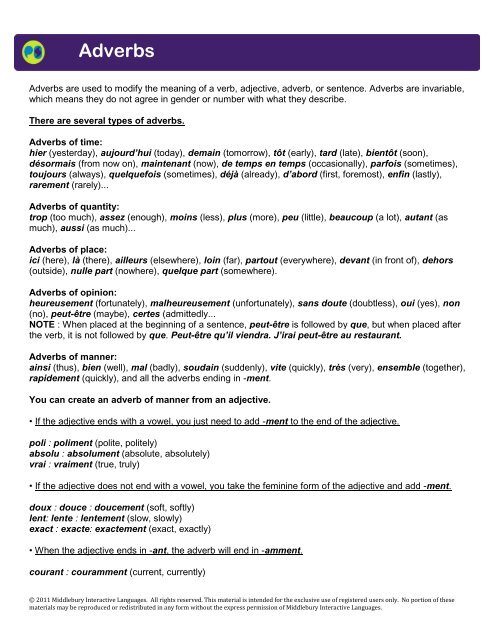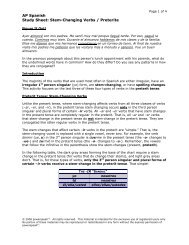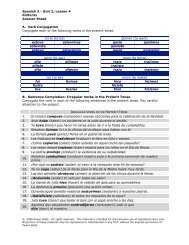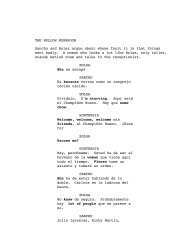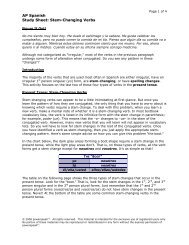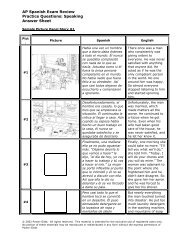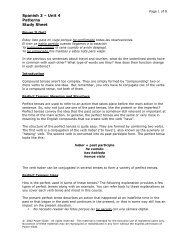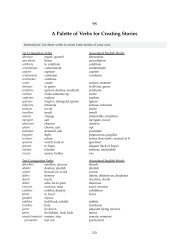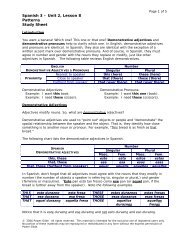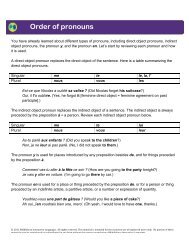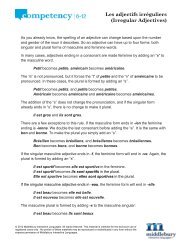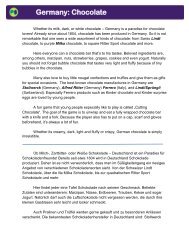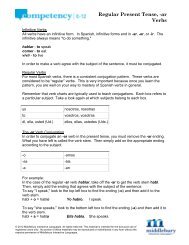Adverbs
Adverbs
Adverbs
Create successful ePaper yourself
Turn your PDF publications into a flip-book with our unique Google optimized e-Paper software.
<strong>Adverbs</strong><br />
<strong>Adverbs</strong> are used to modify the meaning of a verb, adjective, adverb, or sentence. <strong>Adverbs</strong> are invariable,<br />
which means they do not agree in gender or number with what they describe.<br />
There are several types of adverbs.<br />
<strong>Adverbs</strong> of time:<br />
hier (yesterday), aujourd’hui (today), demain (tomorrow), tôt (early), tard (late), bientôt (soon),<br />
désormais (from now on), maintenant (now), de temps en temps (occasionally), parfois (sometimes),<br />
toujours (always), quelquefois (sometimes), déjà (already), d’abord (first, foremost), enfin (lastly),<br />
rarement (rarely)...<br />
<strong>Adverbs</strong> of quantity:<br />
trop (too much), assez (enough), moins (less), plus (more), peu (little), beaucoup (a lot), autant (as<br />
much), aussi (as much)...<br />
<strong>Adverbs</strong> of place:<br />
ici (here), là (there), ailleurs (elsewhere), loin (far), partout (everywhere), devant (in front of), dehors<br />
(outside), nulle part (nowhere), quelque part (somewhere).<br />
<strong>Adverbs</strong> of opinion:<br />
heureusement (fortunately), malheureusement (unfortunately), sans doute (doubtless), oui (yes), non<br />
(no), peut-être (maybe), certes (admittedly...<br />
NOTE : When placed at the beginning of a sentence, peut-être is followed by que, but when placed after<br />
the verb, it is not followed by que. Peut-être qu’il viendra. J’irai peut-être au restaurant.<br />
<strong>Adverbs</strong> of manner:<br />
ainsi (thus), bien (well), mal (badly), soudain (suddenly), vite (quickly), très (very), ensemble (together),<br />
rapidement (quickly), and all the adverbs ending in -ment.<br />
You can create an adverb of manner from an adjective.<br />
• If the adjective ends with a vowel, you just need to add -ment to the end of the adjective.<br />
poli : poliment (polite, politely)<br />
absolu : absolument (absolute, absolutely)<br />
vrai : vraiment (true, truly)<br />
• If the adjective does not end with a vowel, you take the feminine form of the adjective and add -ment.<br />
doux : douce : doucement (soft, softly)<br />
lent: lente : lentement (slow, slowly)<br />
exact : exacte: exactement (exact, exactly)<br />
• When the adjective ends in -ant, the adverb will end in -amment.<br />
courant : couramment (current, currently)<br />
© 2011 Middlebury Interactive Languages. All rights reserved. This material is intended for the exclusive use of registered users only. No portion of these<br />
materials may be reproduced or redistributed in any form without the express permission of Middlebury Interactive Languages.
uyant : bruyammant (noisy, noisily)<br />
étonnant : étonnamment (surprising, surprisingly)<br />
• When the adjective ends in -ent, the adverb will end in -emment, however, it is still pronounced<br />
-amment.<br />
innocent : innocemment (innocent, innocently)<br />
intelligent : intelligemment (smart, smartly)<br />
différent : différemment (different, differently)<br />
Placement of adverbs :<br />
• If an adverb modifies a verb, it will be placed directly after the verb, or between the auxiliary verb and the<br />
past participle in a composite tense.<br />
Elle court beaucoup. (She runs a lot.)<br />
Il a bien réussi son coup. (She pulled it off well.)<br />
• In a composite tense, longer or less common manner adverbs are placed after the past participle.<br />
Josiane a parlé doucement. (Josiane spoke softly.)<br />
Il a parlé poliment. (He spoke politely.)<br />
• Some adverbs of time are placed at the beginning or end of a sentence.<br />
Aujourd’hui, nous partons en vacances. (Today, we’re leaving on a vacation.)<br />
Nous sommes allés au marché hier. (We went to the market yesterday.)<br />
Ils sont partis tard. (They left late.)<br />
• Most adverbs of place follow the past participle.<br />
Nous sommes allés dehors. (We went outside.)<br />
Je l’ai vu là-bas. (I saw it there.)<br />
There are a few fixed expressions in which an adjective functions as an adverb and is therefore invariable.<br />
coûter cher (to cost a lot)<br />
sentir bon, sentir mauvais (to smell good, to smell bad)<br />
travailler dur (to work hard)<br />
parler fort, parler bas (to speak loudly, to speak softly)<br />
Continue to practice forming and using adverbs. <strong>Adverbs</strong> are important words that are used in everyday<br />
language, both orally and written. When practicing, do not forget to pay particular attention to the<br />
placement of adverbs, as this is done differently in French than in English.<br />
© 2011 Middlebury Interactive Languages. All rights reserved. This material is intended for the exclusive use of registered users only. No portion of these<br />
materials may be reproduced or redistributed in any form without the express permission of Middlebury Interactive Languages.


